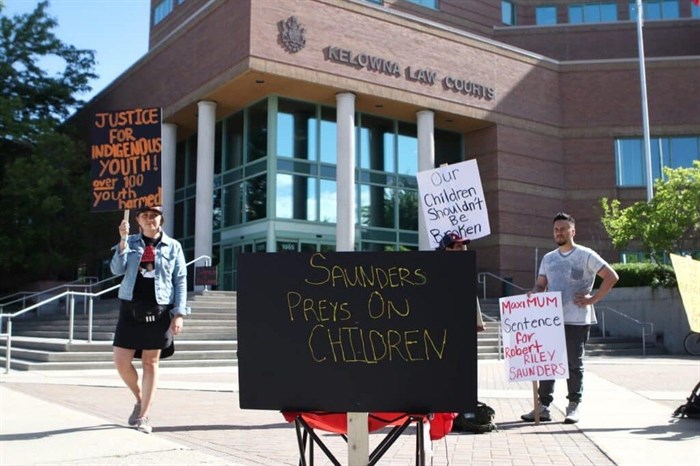
Syilx and sqilx’w community members gathered at the courthouse in Kelowna last June, holding signs that denounced Robert Riley Saunders and called for the protection of Indigenous youth.
Image Credit: Aaron Hemens
October 28, 2023 - 8:00 AM
A man who forged social worker credentials and defrauded youth under his “care” — many of whom were Indigenous — has been granted day parole for a period of six months.
Robert Riley Saunders, who was handed a five-year prison sentence last July, was given the conditional release but denied full parole, according to an Oct. 10 decision from the Parole Board of Canada.
The decision has outraged Indigenous leaders and victims who were defrauded by Saunders, and the First Nations Leadership Council (FNLC) is calling for an immediate reversal of the decision.
“The Parole Board acknowledged that the youth suffered as a result of the thefts, but that didn’t seem to factor significantly in its decision,” the FNLC said in a statement on Oct. 13.
Union of British Columbia Indian Chiefs vice-president chief Don Tom said Saunders was only able to defraud Indigenous youth for six and a half years because of the failures of the province’s child “welfare” system.
“With this decision to grant Mr. Saunders parole, the justice system has once again failed First Nations victims,” he said in a statement.
“First Nations people have been victimized by the justice system for 200 years. It is clearly time for fulsome reform.”
First Nations Summit political executive Hugh Braker also said in the statement that “many decisions of the National Parole Board are seen as ‘Get out of Jail Free’ cards while youth victims continue to suffer, many for the rest of their lives.”
“There needs to be a rethink and re-imaging of the Canadian justice system, so there is more alignment between the principles of sentencing and the principles guiding parole,” he added.
“These types of decisions by the Parole Board single-handedly bring the administration of justice into disrepute.”
Aden Withers, a victim of Saunders, spoke to APTN National News about her own experience, noting that she was given just $30 a week in cash to get by and that surviving was a struggle.
“The reality is that he ruined so many lives,” Withers said the article published Oct. 20.
“There were kids who never got to see his day in court because they didn’t survive the homelessness and addictions. He directly fed into that by re-traumatizing traumatized youth.”
The conditions for day parole include no contact with the victims, providing documented financial information to the satisfaction of his parole supervisor, and no responsibility — paid or unpaid — for the management of finances or investments for any other individuals, charity, business or institution.
“After reviewing and weighing the relevant factors in your case, the board puts weight on your limited criminal history, your good behaviour when on bail, your positive engagement in voluntary interventions, and your viable release plan,” the board wrote in its decision.
“It is the board’s opinion that you will not present an undue risk to society if released on day parole to other location and that your release will contribute to the protection of society by facilitating your reintegration into society as a law-abiding citizen.”
The decision notes that Saunders has been accepted to a community residential facility (CRF) in Alberta, plans to attend individual counselling and has an offer of employment from an undisclosed employer.
It also notes the board denied Saunders’s application for full parole because he continues “to require a level of oversight” given his ability to keep his offences secret for a long time and because his “release plans continue to include financial uncertainty, which has the potential to be destabilizing.”
On July 25, 2022, Saunders had been sentenced to five years in prison for of fraud over $5,000, breach of trust and forgery.
The court heard that he had been first hired by the B.C. Ministry of Children and Family Development (MCFD) in 1996 in Fort St. John, using a forged bachelor of social work degree from the University of Manitoba, and that his then-girlfriend assisted in forging the document.
Five years later, Saunders transferred to Kelowna in syilx homelands. While working as a social worker with MCFD’s Indigenous Integrated Family Service and Guardianship, Saunders opened 24 joint bank accounts with youth, whose wellbeing he was supposed to look out for.
For six and a half years, starting in June 2011, he issued more than 850 ministry cheques to the youth, which he deposited in each youth’s account. The cheques totalled more than $460,000. Since the funds were in a joint account, Saunders was then able to transfer the money to his own personal bank account. Most of the cheques, which ranged from support payments to startup funds for youth aging out of care, were in amounts of $579.
The judge who heard Saunders’ case convicted him of misappropriating more than $460,000 and a breach of trust and using a forged degree to get a job as a social worker with the Ministry of Child and Family Development in B.C. at the time.
— With files from Aaron Hemens
— This story was originally published by IndigiNews.
News from © iNFOnews, 2023